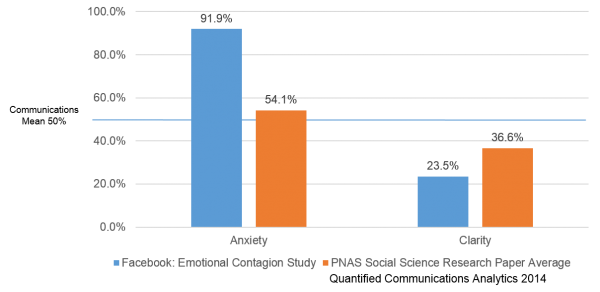Where Facebook’s “Poorly Communicated” Research Went Wrong

Background:
In 2012, Facebook conducted a study to test how emotions affect people’s behavior. They filtered the news feeds for about 700,000 people for a one week period. Some people were shown fewer instances of positive posts, while others were shown fewer instances of negative posts. They found the emotions to be contagious: those that were shown positive content were more likely to share positive content and those that were shown negative content were more likely to share negative content.
Facebook recently published its findings as an academic paper in the Proceeding of the National Academy of Sciences (PNAS). Upon publication, a public outcry began as many people feel that Facebook crossed the line in conducting this study. Upset users claim they should have been made aware that they were a part of the research. Many people also claim that the study was unethical, as the increased negative content could have had a huge impact on emotionally vulnerable people (for example, people under the age of 18 or people who suffer from depression).
Facebook’s Response:
Last Wednesday, Sheryl Sandberg, COO of Facebook, had this to say about the study according to the Wall Street Journal: “This was part of ongoing research companies do to test different products, and that was what it was; it was poorly communicated. And for that communication we apologize. We never meant to upset you.”
Adam Kramer, one of the researchers in the experiment also published an apology: “My co-authors and I are very sorry for the way the paper described the research and any anxiety it caused. In hindsight, the research benefits of the paper may not have justified all of this anxiety.”
What We Did:
Because Sheryl Sandberg apologizes for the communication, we decided to analyze the language of the research paper in an attempt to see where they went wrong. As a benchmark, we compared the Facebook study to 20 other social science research papers recently published in PNAS.
What We Found:
After analyzing the data, we found the two metrics that stood out in the Facebook Study to be high levels of anxiety and significantly low message clarity:
- Anxiety: Kramer was right to apologize for any anxiety caused by the study. Facebook’s emotional contagion study contains 37.8% more anxious language than the average of social science research papers in our data set.
- Message Clarity: We also found lower than average levels of clarity for the Facebook research paper. This unclear language can lead to reader confusion, which only increases the level of anxiety felt after reading the paper.
As the Facebook study and many others have shown, emotional contagion does exist. People tend to pick up the emotions of others, whether it’s through a research paper, an article, or a public speaking setting. Given the high levels of anxiety found in Facebook’s academic paper, it’s not surprising to see the high level of public anxiety surrounding the study. Even when writing a research paper, be wary of the emotional tone you use and be sure to write as clearly as possible.
